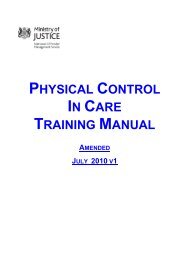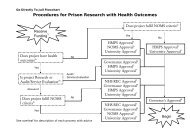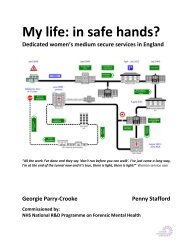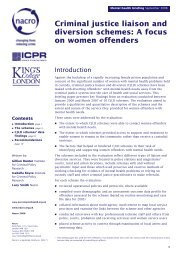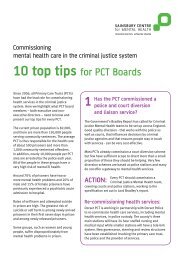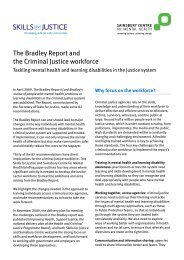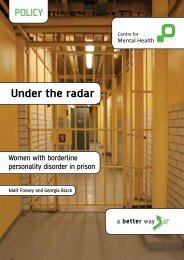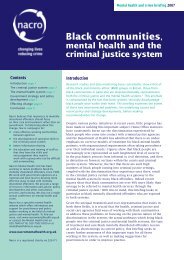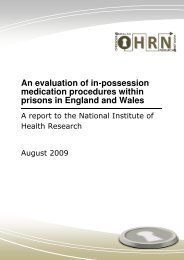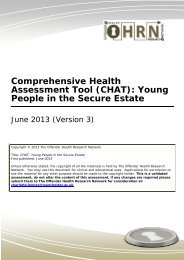Engendering Justice - from Policy to Practice - The Fawcett Society
Engendering Justice - from Policy to Practice - The Fawcett Society
Engendering Justice - from Policy to Practice - The Fawcett Society
- No tags were found...
Create successful ePaper yourself
Turn your PDF publications into a flip-book with our unique Google optimized e-Paper software.
Chapter Five:<strong>Justice</strong> Needs WomenWomen as Workers in the Criminal <strong>Justice</strong> SystemI do feel there is a disadvantage for progression <strong>to</strong> senioruniformed ranks. I feel sure there must be other waysof assessing officers rather than having <strong>to</strong> spend weeksaway <strong>from</strong> home on the Strategic Command Course. 203<strong>The</strong> long working hours culture was perceived as an implicitrequirement for promotion by many respondents and wasalso viewed as disadvantaging women. One woman <strong>to</strong>ldthe Commission:I feel that for some women working long hours is fineif they do not have home commitments or they havefamilies which can help with things like child care. If youare not in that position, then the Force can be a difficultplace <strong>to</strong> work. 204This culture of ‘presenteeism’ and long working hoursis actually detrimental <strong>to</strong> all officers and staff, butmay particularly disadvantage individuals with caringresponsibilities. Management should lead by example inworking appropriate hours.…the long hours culture that seems <strong>to</strong> be encouragedespecially if you are wanting promotion is a disadvantage,as we aren’t so willing <strong>to</strong> do those hours just <strong>to</strong> be seenhere…I also think that is a common misconception thatyou do more if you are here longer. Far <strong>from</strong> it, if youmanage your time effectively it should be achievable withinour contracted hours.Female working in the Police, Questionnaire Response,December 2008At lower ranks there are more opportunities <strong>to</strong> be promotedbut there is a perception that promotion can only comeabout with recent operational practice and that it mayinvolve de-skilling. For example, some departments donot contain sergeant ranks and therefore in order <strong>to</strong> bepromoted officers will have <strong>to</strong> move <strong>to</strong> another department,often with operational duties and therefore shift work. 205Women may also be ‘siloed’ in<strong>to</strong> particular departmentsbecause they offer the opportunity <strong>to</strong> work more flexibly. Forexample, there are a high proportion of women working inneighbourhood teams and in the Child Protection Unit. 206I think the promotion system within the police is flawed.It is not enough <strong>to</strong> be very good at your job, you have <strong>to</strong>provide evidence of ‘extra’ work and responsibilities thatyou have taken on - not easy when you are doing a fulltime job and thinking about collecting kids <strong>from</strong> nurseryand what <strong>to</strong> cook for tea…Female working in the Police, Questionnaire Response,December 2008<strong>The</strong> Commission received evidence <strong>from</strong> both police staffand police officers. Police staff provide the organisationalcapacity for the police service performing more than 200different roles including training and recruitment, dealingwith 999 calls and preparing case papers. <strong>The</strong> Commissionis concerned, especially given the high proportion of womenamong police staff, that there are fewer opportunitiesfor promotion and career development for police staff incomparison <strong>to</strong> those offered <strong>to</strong> police officers. 207Some specialist roles continue <strong>to</strong> be male dominated. <strong>The</strong>use of fitness tests for particular roles may be one barrier.Fitness tests are still typically based upon a male standard,such as requiring upper body strength. 208 Fitness testsshould be designed according <strong>to</strong> the actual tasks requiredfor the role.A number of respondents who shared their views with theCommission suggested that having women on the selectionpanel for specialist roles may increase the number of femaleapplicants. As one woman <strong>to</strong>ld the Commission:I feel that women who want <strong>to</strong> move in<strong>to</strong> specialist, maledominated roles feel more relaxed and perform betterwhere a woman is on the interview panel and advertisingthe fact in advance increases female applicants. Women’snetworks also improve confidence. 209Female-only training may also encourage women <strong>to</strong> attendspecific training courses. For example, West MidlandsPolice force offered a standard mo<strong>to</strong>rcycle evaluationcourse for female officers only. <strong>The</strong> Commission alsowelcomes the development of training which specificallytargets the development of women, such as theSpringboard programme (see box). <strong>The</strong> developmen<strong>to</strong>f women’s networks within forces is also encouraging.Men<strong>to</strong>ring schemes should also be considered within eachPage 70



